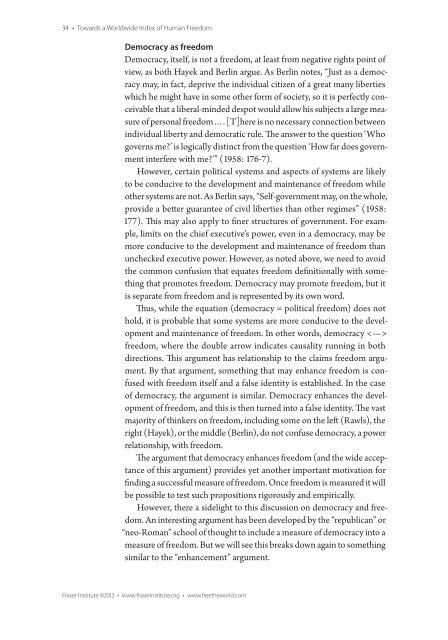Towards a Worldwide Index of Human Freedom
Towards a Worldwide Index of Human Freedom
Towards a Worldwide Index of Human Freedom
Create successful ePaper yourself
Turn your PDF publications into a flip-book with our unique Google optimized e-Paper software.
34 • <strong>Towards</strong> a <strong>Worldwide</strong> <strong>Index</strong> <strong>of</strong> <strong>Human</strong> <strong>Freedom</strong><br />
Democracy as freedom<br />
Democracy, itself, is not a freedom, at least from negative rights point <strong>of</strong><br />
view, as both Hayek and Berlin argue. As Berlin notes, “Just as a democracy<br />
may, in fact, deprive the individual citizen <strong>of</strong> a great many liberties<br />
which he might have in some other form <strong>of</strong> society, so it is perfectly conceivable<br />
that a liberal-minded despot would allow his subjects a large measure<br />
<strong>of</strong> personal freedom…. [T]here is no necessary connection between<br />
individual liberty and democratic rule. The answer to the question ‘Who<br />
governs me?’ is logically distinct from the question ‘How far does government<br />
interfere with me?’” (1958: 176-7).<br />
However, certain political systems and aspects <strong>of</strong> systems are likely<br />
to be conducive to the development and maintenance <strong>of</strong> freedom while<br />
other systems are not. As Berlin says, “Self-government may, on the whole,<br />
provide a better guarantee <strong>of</strong> civil liberties than other regimes” (1958:<br />
177). This may also apply to finer structures <strong>of</strong> government. For example,<br />
limits on the chief executive’s power, even in a democracy, may be<br />
more conducive to the development and maintenance <strong>of</strong> freedom than<br />
unchecked executive power. However, as noted above, we need to avoid<br />
the common confusion that equates freedom definitionally with something<br />
that promotes freedom. Democracy may promote freedom, but it<br />
is separate from freedom and is represented by its own word.<br />
Thus, while the equation (democracy = political freedom) does not<br />
hold, it is probable that some systems are more conducive to the development<br />
and maintenance <strong>of</strong> freedom. In other words, democracy <br />
freedom, where the double arrow indicates causality running in both<br />
directions. This argument has relationship to the claims freedom argument.<br />
By that argument, something that may enhance freedom is confused<br />
with freedom itself and a false identity is established. In the case<br />
<strong>of</strong> democracy, the argument is similar. Democracy enhances the development<br />
<strong>of</strong> freedom, and this is then turned into a false identity. The vast<br />
majority <strong>of</strong> thinkers on freedom, including some on the left (Rawls), the<br />
right (Hayek), or the middle (Berlin), do not confuse democracy, a power<br />
relationship, with freedom.<br />
The argument that democracy enhances freedom (and the wide acceptance<br />
<strong>of</strong> this argument) provides yet another important motivation for<br />
finding a successful measure <strong>of</strong> freedom. Once freedom is measured it will<br />
be possible to test such propositions rigorously and empirically.<br />
However, there a sidelight to this discussion on democracy and freedom.<br />
An interesting argument has been developed by the “republican” or<br />
“neo-Roman” school <strong>of</strong> thought to include a measure <strong>of</strong> democracy into a<br />
measure <strong>of</strong> freedom. But we will see this breaks down again to something<br />
similar to the “enhancement” argument.<br />
Fraser Institute ©2012 • www.fraserinstitute.org • www.freetheworld.com


